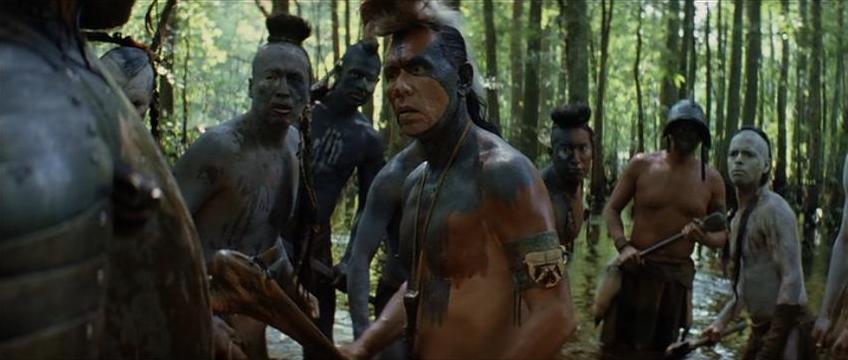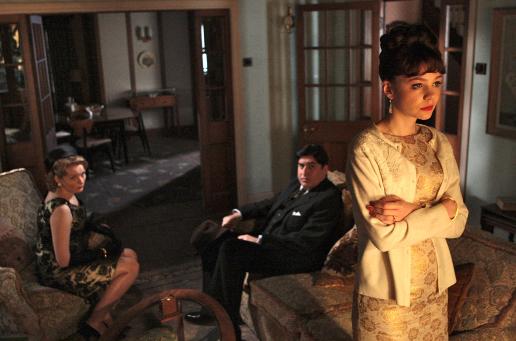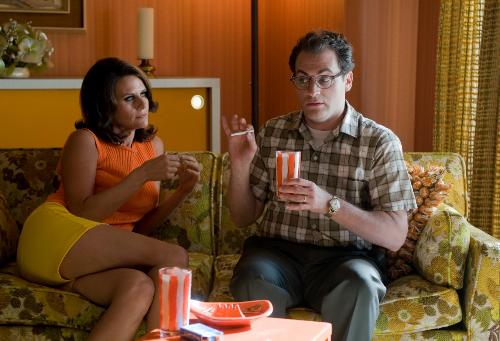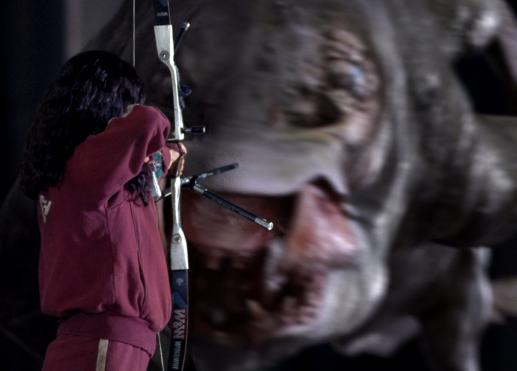 Films I Might Have Underestimated:
Films I Might Have Underestimated: I haven't been an unqualified fan of any of the Pixar films except the
Toy Storys, though
The Incredibles comes very close.
Ratatouille, though, is a rare case of a Pixar film where I didn't feel anything, almost all of the way through. The illustrating and production design seemed really fussy and detailed but not in especially evocative ways, the characters who weren't Remy the Rat just slid off the screen, and the dynamics of the story seemed oddly simple by Pixar standards, and certainly when compared to the industriousness of the artistry.
Babe nailed the fairy-tale wonder of the pig who wants to be a sheepdog, but except for the delicious climactic spectacle of a kitchen
full of rats,
Ratatouille just seemed to lope along with its "Anyone can cook! Be whoever you want to be!" trajectory. Was I feeling hard-hearted that night? It wasn't as overtly modest as
Cars, and I'm inclined to give credit to Brad Bird, but I remember astonishingly little of this movie, and felt out of the loop of the serious critical enthusiasm. I hustled myself through
Boarding Gate to be able to make a Top 10 list at the end of the year, which isn't the way to absorb what's special about an Assayas film, and certainly wasn't the right frame of mind for such a sharp little splinter of upscale exploitation. I know lots of people who really love
In the Valley of Elah, which catches me off-guard because I remember
literally not knowing another person who had seen it in the theater. The two things I objected to most were the narrative disarray and what I thought of as the perfunctory photography of Roger Deakins, but I've heard several folks speak ardently on behalf of the latter, and I'm intrigued by Paul Haggis's overt valorization of this movie over his much more "successful"
Crash. And I certainly signed on to all the raves for Tommy Lee Jones. His surprise Oscar nomination sure tasted sweet.
Films I Might Have Overestimated: Chicago 10, which debuted at festivals in 2007, was nearly the last movie I saw before the end of 2008. I was so taken aback by how much it impressed me and swept me up that it became a surprise qualifier, even to me, for my
Top Ten list. I still appreciate the energy, prankishness, and danger of the piece, and the utterly rare reminder of what a genuine culture of American dissent can look and sound like. Yet I'm always a bit abashed about ranking it above so many other strong films. The reason, I'm sure, is that my surge of feeling for the film came only a month after the election of Barack Obama, and I live down the street from Grant Park; also, I had just spent eight years wondering if this sort of mass uprising was still possible in the U.S., and why it hadn't happened. Anytime I have such strong reason to suspect contextual reasons for valuing a film, I worry that I have let them overcloud the film "itself," whatever that means. I still strongly believe in
Chicago 10, but in any case, it will be at least another year or two before I'm ready to go back and ascertain.
 The Counterfeiters
The Counterfeiters, by contrast, was one of the first movies I saw in a theater in 2008, and though it's often singled out as an exemplary case of weak recent claimants of the Best Foreign Language Film Oscar, I actually admired its visual stringency and its harrowed quiet. Was I wrong?
Broken English was a fun rental, with Parker Posey making her first real bid since
Personal Velocity as a semi-dramatic actress in a brokenhearted story. I savored lots of the comic touches, too, but I've talked to a lot of women who dislike the movie, and their points have been pretty persuasive. (Still, how some of the same friends dislike this and totally run with
Sex and the City frankly eludes me.) Speaking of nerves about gendered representations, though, I have a quite palpable memory of sitting at
Knocked Up being surprised at all the brio, personality, and surprise zingers by which it was triumphing over such a brazenly sexist and self-serving script. The brazenness and the sexism are much clearer in retrospect than the redemptive jokes and aspects of performance, which are pretty evanescent if you aren't sitting in front of them. I can't imagine holding onto the same "B" after another look, but I really don't want another look. Maybe the steepest dive I can see coming among my estimations of 2007 films would be for Brian De Palma's
Redacted, whose experiments in multimedia storytelling struck me as noble and apropos, but I've had
nothing to say to objectors who find the whole project hectoring and crass and the performances irretrievably amateurish.
 One Way or Another, I Need Another Look at:
One Way or Another, I Need Another Look at: It's rare that work in a familiar genre earns the hype of representing something totally new for that genre, but after one more look to make sure, I'll be ready to espouse that Sokurov's
Alexandra is a totally new kind of war film. My well-known skepticism about Ang Lee took a surprise vacation for the bright, hot, and hard
Lust, Caution, and since I still need to write up why Tang Wei gave the best female performance in American cinemas in 2007, against some stellar competition, I have all the more reason to revisit the picture, with my notepad out. Two critical darlings of the year,
There Will Be Blood and
Zodiac, struck me as winning the kinds of reviews that were only too willing to overlook what I saw as patent flaws—the wobbly handling of the Dano character and the rushed, tendentious final act of the Anderson, and, for
Zodiac, the baggy middle, the myopic treatment of the wife, and the self-insulating logic that it's
supposed to feel endless, erratic, and lost up its own wazoo. I haven't been back to either film to sort wheat from chaff, though I have restless feelings about both films that suggest I could like them much more, much less, or about the same. Ira Sachs's
Married Life, by contrast, was a movie that few people had time for, and I agree that the cast didn't feel fully unified, and the script might have gained from one more rewrite. Certainly there's little if anything in it to compete with the empyrean pathos of
Far from Heaven, but I remember finding it brave of Sachs to attempt a similar critique of 50s-filtered representations without the seductive safety net of plush melodrama. I like its coldness, and I love those opening credits. Lastly, I saw
Silent Light over two years ago, and though I found Reygadas to be currying too much favor on aesthetic grounds without having enough to do or say with his scenario or characters, I have a hard time recovering how smitten I was with the cinematography, and in the case of
Silent Light, that's a major thing to forget.
Undistributed: Why has nobody distributed Joanna Hogg's
Unrelated for a U.S. release? Could all the recent hubbub about women directors, even if Manohla Dargis is right (and she is) about all the inequities being swept under the rug of a few breakout exceptions, possibly help this funny, sad, and surgically lucid drama? It centers around the single, middle-aged plus-one, rendered in a fantastic, quiet performance by Kathryn Worth, who gets included in a family friend's vacation. She tries both to distance herself from a friend whom she obviously finds distasteful and to endear herself to the younger set, whose libido and irreverence she just as clearly envies, and from whom even one glancing acknowledgment or one conspiratorial confidence is manifestly intoxicating. Then again, It's not just the indies abroad who need help in the U.S. market. Henry Barrial's
True Love was by far my favorite discovery of the Indianapolis Film Festival in 2008, even though I couldn't talk my fellow jurors into giving it a prize. Anyone who can succeed with one of those dramedies based on overlapping urban lives, and can do so without skimping on the comedy or the rue or the human complexity, deserves a moment in the sun, if for no other reason than to show the bulbous, Hollywood versions how this sort of thing is done. But
True Love generates plenty of other reasons for being granted wider exposure. Val Lauren's and Andrea Helene's performances would look right at home on an Independent Spirit ballot, and the whole movie is sexy and bittersweet. With or without that bland title, I hope the movie finds a home somewhere.
 Best Case for Trying Again:
Best Case for Trying Again: While we're speaking, though, of pitfalls of distribution: how exactly do you defy decades of industrial context to become an accomplished female filmmaker in Japan, and then scoop the Grand Jury Prize in competition at Cannes with a rare foray out of documentary, and
still your film doesn't make a blip on American shores? I concede that Naomi Kawase's
The Mourning Forest isn't the most electrifying sit on first pass, and it seems to make a fetish of lengthy shots of wind in the grass, or low-angle shots of magisterial trees, or nursing-home residents calligraphing away in their quiet, final days. All stuff we've seen and possibly snored through before. But there's a tougher, more slippery movie hidden inside the beatific and patience-testing one that
The Mourning Forest often resembles, and occasionally is. Finally tracking the film down on international DVD, I liked it enough to feel justified in my ire at its poor fortunes on the world market, despite that glittering prize. Teaching it in a Contemporary Women Filmmakers course made me even more confident of its subtle deftness and its spiritual and formal nuances. Again, hopefully all the chatter about the Bigelows and Scherfigs and Campions, or maybe a subsequent feature by Kawase that's a little easier on the audience than this one, will make a difference to the money people, allowing more people to take this trip. As though a chance to see the film that bested
The Diving Bell and the Butterfly,
Persepolis,
Zodiac, and
No Country for Old Men for the second-highest award on the Croisette shouldn't already be enough of a hook, if they hadn't let that potential marketing angle get so cold.
Performances I'm Most Eager to Revisit: I think the most unimprovable critical zap that I overheard from someone I don't actually know sprang from the lips of Tim's friend Fiona, who said of
The Assassination of Jesse James by the Coward Robert Ford that "the weather is overacting." Brad Pitt, for me, was both over- and underacting, but I've already
attested to my high regard for Garret Dillahunt in that picture, and I'd be curious to take a second peep at Casey Affleck and Jeremy Renner, too. Laura Vasiliu and Vlad Ivanov clicked for me in some but not necessarily all ways while I was watching
4 Months, 3 Weeks, and 2 Days, in contrast to the exemplary lead turn by Anamaria Marinca. Certain critics groups, most famously the LAFCA, felt more sanguine, and I'm eager to try again. All through watching Fatih Akin's
The Edge of Heaven, I thought to myself, "Who is that phenomenal, delicate actress playing the worried mother? She's so good!" Color me surprised when she turned out to be Fassbinder axiom Hanna Schygulla, and then again, a few weeks later, when the National Society of Film Critics echoed my feelings with their Best Supporting Actress prize. I'll be curious to see how the turn plays now that I'm expecting to pay attention to it, rather than having it fortuitously catch my eye. Sam Rockwell has been a tough taste for me to acquire over the last decade, but 2007 finally gave me two performances, in
Joshua and in
Snow Angels, where I felt some of the admiration that came more quickly to many others. Since I predict he'll be around for a while, it's worth boning up on my favorite peaks in his body of work. Lastly, two diametrically different Oscar nominees. Hal Holbrook easily deserved the prize for
Into the Wild, for a turn so emotionally naked without ever wheedling the audience that I'm almost embarrassed to have it sitting on a shelf, ready to call up with the pop of a button and the flick of a remote. And Cate Blanchett, God bless her, had the phenomenal chutzpah to grimace at her own stentorian belting in
Elizabeth: The Shriekquel, which, given my initial and perfectly understandable
rejection of the movie, is ironically the only possible cue for me to look again. Did she know the whole time that she was going that Big? Was she having fun with it? Was she fighting a losing battle to give Shekhar what he demanded but find little windows to entertain herself? I'll probably regret a second visit, but even if it's irrecuperable as a film, it's hard to beat as a bitchtastic drag revue.
 Top Ten Films Still to Catch from 2007:
Top Ten Films Still to Catch from 2007: 1.
Secret Sunshine (South Korea), dir. Lee Chang-dong, with Jeon Do-yeon
2.
The Secret of the Grain (France), dir. Abdel Kechiche, a César champ
3.
Import/Export (Austria), dir. Ulrich Seidl, a John Waters favorite
4.
XXY (Argentina), dir. Lucía Puenzo, about an intersexed child
5.
Chop Shop (USA), dir. Ramin Bahrani, with Alejandro Polanco
6.
Heartbeat Detector (France), dir. Nicolas Klotz, with Mathieu Amalric
7.
Nightwatching (UK/Netherlands), dir. Peter Greenaway
8.
Frownland (USA), dir. Ronald Bronstein, with Dore Mann
9.
Dark Matter (USA), dir. Shi-Zheng Chen, with Meryl Streep
10.
Battle for Haditha (UK), dir. Nick Broomfield, with Matthew Knoll
Runners-up: Golden Bear winner
Tuya's Marriage; Tilda testing meta-reality with Lynn Hershman-Leeson in
Strange Culture and the limits of the anti-event in
The Man from London;
The Banishment, a Best Actor winner at Cannes, from
The Return director Andrei Zvyagintsev; Nikita Mikhalkov's Oscar-nominated
12;
I Served the King of England, from Czech New Waver Jirí Menzel; John Sayles gets musical with
Honeydripper; two well-reviewed titles by French women directors,
Actrices, by French actress Valeria Bruni-Tedeschi and
Water Lilies by Céline Sciamma; more lilies, this time in the Taiwanese lesbian drama
Spider Lilies; Abel Ferrara, directing Asia Argento and others through
Go Go Tales; Aaron Katz's
Dance Party USA follow-up
Quiet City; Denzel Washington's Globe-nominated drama
The Great Debaters; Jonathan Demme's presidential bio documentary
Jimmy Carter: Man from Plains; and Takashi Miike's
Sukiyaki Western Django, an easy champ over
Vicky Cristina Barcelona in the category of titular non-sequiturs, if you ask me.

Labels: BwdFwd 00s

 Nick's Flick Picks: The Blog
Nick's Flick Picks: The Blog




















































